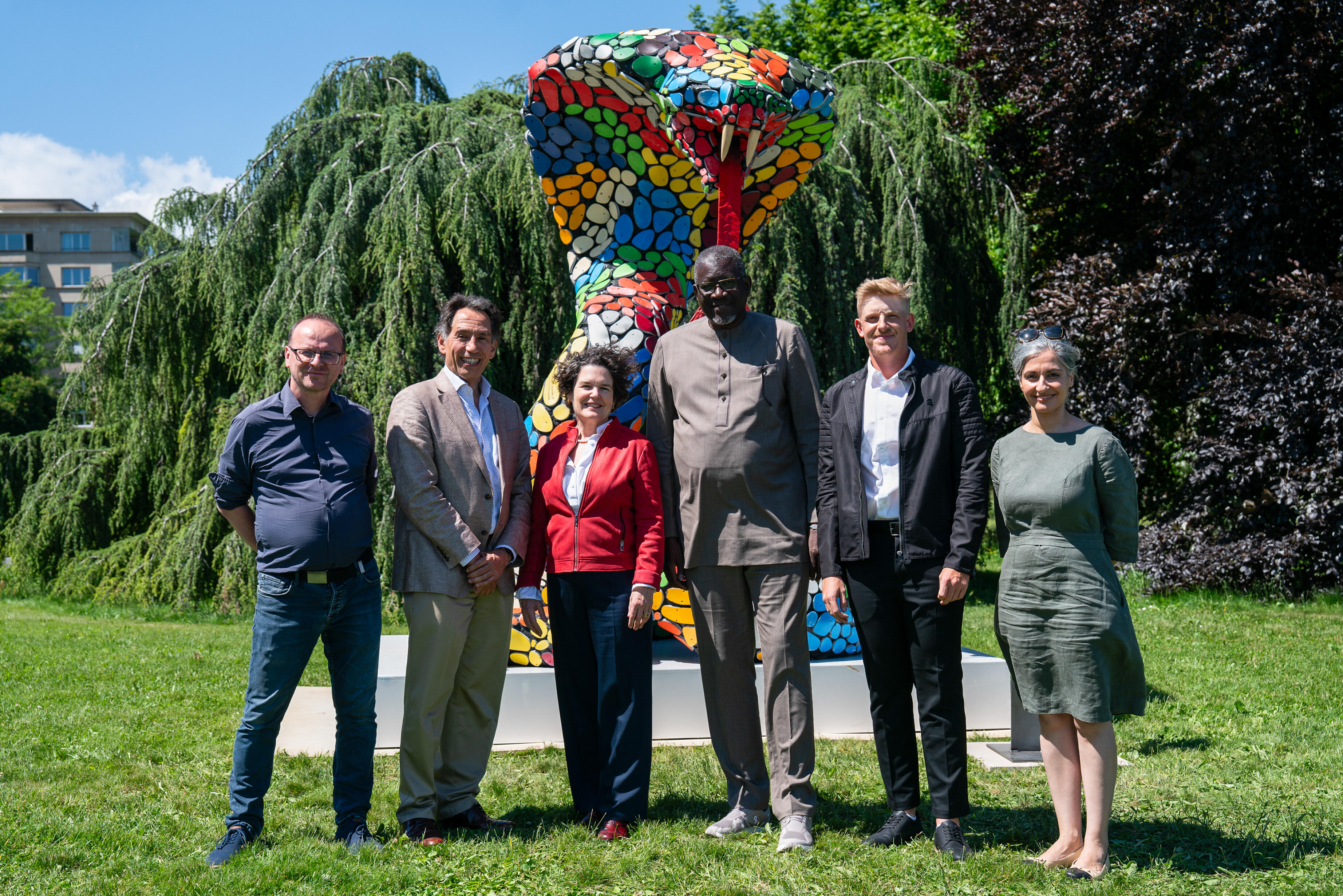
A new Global Snakebite Taskforce, co-chaired by Liverpool School of Tropical Medicine’s Chancellor Elhadj As Sy, has been launched at the 78th World Health Assembly in Geneva.
The Taskforce is co-chaired by As and the Hon Aden Duale, Cabinet Secretary to the Kenyan Ministry of Health, and also includes LSTM Vice-Chancellor Professor David Lalloo alongside fellow experts, policymakers, funders, researchers, health professionals, community advocates, and global leaders.
It forms the strategic arm of the Strike Out Snakebite (SOS) initiative and aims to elevate the visibility of this snakebite envenoming on the global stage and catalyse resources for snakebite treatment and interventions.
The Taskforce’s launch has been marked with the release a new report to highlight the critical need for action against the ‘devastating and preventable human toll of snakebite envenoming’. They also unveiled a confronting art installation to highlight the critical need for action against the daily threat of snakebite envenoming.
The Taskforce’s report, Time to Bite Back: Catalyzing a Global Response to Snakebite Envenoming, tracks progress towards the World Health Organization’s (WHO) target of halving deaths and disabilities from snakebite envenoming by 2030 and calls on the global community to accelerate action.
The report highlights that significant advancements can be made if governments and organisations invest in safe and effective treatments, ensure antivenoms are accessible to all, phase out substandard and false antivenom products from the market, equip healthcare systems and professionals with the necessary tools and knowledge, and support community prevention and education initiatives.
Elhadj As Sy, Chancellor of LSTM and Co-Chair of the Global Snakebite Taskforce, said: “While the risk of snakebite may feel remote for many global leaders, the devastating and preventable human toll of snakebite envenoming can no longer be ignored by the international community. Our message is clear, nobody should be dying from a snakebite in 2025.
“This is a solvable challenge and one of the most cost-effective global health issues to tackle, with a real possibility to eliminate this suffering. We have many of the tools to save lives and livelihoods, but we urgently require the political will, momentum and funding. Together we can – and must – Strike Out Snakebite.”
Hon. Minister Aden Duale, Kenyan Minister for Health and Co-Chair of the Global Snakebite Taskforce, said: “Like many other countries, snakebite envenoming is a critical issue for Kenya, disproportionately affecting our rural communities and children. After years of snakebite being in the shadows, securing snakebite onto the official WHA agenda for the first time this decade is a significant moment and testament to Kenya's commitment to addressing this overlooked, but eliminable, health challenge.
“By prioritising snakebite on the global agenda, we are not only advocating for the health, safety and livelihoods of our citizens, but setting a precedent for other nations to also step up. This is the start of a new chapter of international collaboration to ensure no more lives are lost to this preventable health challenge."
Dr. Patrick Amoth, EGH, Director General for Health, Kenya, said: “Ensuring that Snakebite Envenoming is on the global agenda is highly important to The Kenyan Ministry of Health, and we are committed to being at the forefront of action to tackle this global health crisis that has been hiding in plain sight.
“Every five minutes, 50 people around the world are bitten by a snake, four will be permanently disabled, and one will die. Across the African continent alone, 435,000 – 580,000 people are envenomed annually, causing disability, life changing injury and death. With the issue of snakebite now officially back on the WHA agenda, we have a critical opportunity to come together to galvanise global action.”
Snakebite is one of the world's deadliest yet most overlooked Neglected Tropical Diseases (NTDs), causing 138,000 deaths every year, and many more suffer severe injuries and amputations that profoundly impact their lives and livelihoods. However, with increased visibility, political momentum and a clear investment pipeline, the taskforce is hopeful that this preventable global health issue can be tackled.
Alongside the report a public art series has opened in Geneva's Parc Mon Repos. The ‘Snakeover’ aims to bring the urgency of the snakebite crisis to the international community’s attention. Through 10 individual artworks, including a 3-meter snake sculpture and series of warning signs and illustrations, the work brings to life the physical threat, the significant human impact, and the hope inspired by scientific research and development.
LSTM is committed to action towards reducing the global impact of snakebite envenoming. Its Centre for Snakebite Research & Interventions diverse portfolio of research activities to better understand the biology of snake venoms and improve the efficacy, safety, and affordability of antivenom treatment for tropical snakebite victims.
The Strike Out Snakebite initiative and the Global Snakebite Taskforce have been made possible with the support of Wellcome.
To learn more about Strike Out Snakebite and the work of the Global Snakebite Taskforce in driving action for snakebite envenoming, please visit www.linkedin.com/company/strike-out-snakebite-sos or search ‘Strike Out Snakebite’ on LinkedIn.